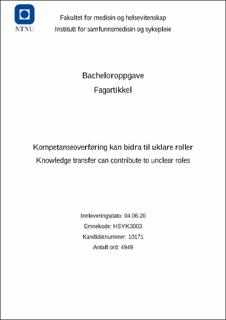Kompetanseoverføring kan bidra til uklare roller
Bachelor thesis
Permanent lenke
https://hdl.handle.net/11250/2669570Utgivelsesdato
2020Metadata
Vis full innførselSamlinger
Sammendrag
Sammendrag
Introduksjon: Hjerneslag er en økende utfordring og sykepleiere vil få et økende ansvar for rehabilitering i årene som kommer. Artikkelen tar for seg sykepleiers rolle i det tverrfaglige samarbeidet i rehabiliteringen av slagpasienter. Samtidig belyses rollen kompetanseoverføring spiller i det tverrfaglige samarbeidet.
Metode: For å besvare problemstillingen er det brukt en kvalitativ undersøkelsesmetode. Det ble gjennomført fire semistrukturerte intervju av en tverrfaglig gruppe ansatte ved et utenlandsk rehabiliteringssenter. Intervjuene ble gjennomført i praksis i februar-mars 2020 og deretter analysert ved hjelp av meningsfortetting.
Resultat: Resultatene viser at informantene er positive til tverrfaglig samarbeid og at de benytter kompetanseoverføring for å muliggjøre hyppigere trening. Alle informantene var tydelige på hva som er deres oppgaver og uttrykte lite usikkerhet rundt sin rolle.
Konklusjon: Studien viser at kompetanseoverføring kan bidra til uklare roller, men samtidig forbedre samarbeidet og resultatene. Kompetanseoverføring er lite omtalt i faglitteratur og forskning, og det er derfor et behov for mer forskning på kompetanseoverføring i tverrfaglig samarbeid. Både faglitteratur og forskning viser at det er uklarhet rundt sykepleiers rolle i tverrfaglig samarbeid i rehabiliteringen av slagpasienter. Det er derfor behov for mer forskning på og tydeliggjøring av sykepleiers rolle i tverrfaglig samarbeid i rehabiliteringen av slagpasienter. Summary
Introduction: Stroke is an increasing challenge for the health care system and nurses will have an increasing responsibility for rehabilitation in the years coming. This article discusses the role of nurses in the interdisciplinary collaboration in the rehabilitation of stroke survivors. Simultaneously, the article illustrates the role of knowledge transfer in the interdisciplinary collaboration.
Method: A qualitative methodology has been used to illustrate this issue. Four semi-structured interviews were conducted with a multidisciplinary selection of employees at a foreign rehabilitation centre. The interviews were conducted in February and March 2020 and later analysed using the method concentration of meaning.
Results: The results indicate that the informants are positive to interdisciplinary collaboration and that they use knowledge transfer to enable more frequent training. All informants were clear on what their tasks were and expressed little uncertainty about their roles.
Conclusion: The study demonstrates that knowledge transfer can contribute to unclear roles, but also improve the collaboration and the results. Knowledge transfer is not widely mentioned in literature and research. Consequently, there is a need for more research on knowledge transfer in interdisciplinary collaboration. Both literature and research indicate that there is unclarity regarding the role of nurses in interdisciplinary collaborations and in the rehabilitation of stroke survivors. Therefore, more research and a clarification are required on the role of nurses in interdisciplinary collaborations and in the rehabilitation of stroke survivors.
